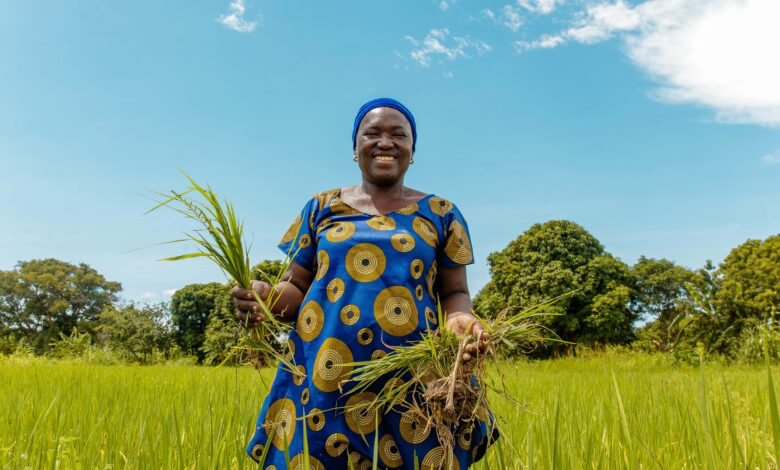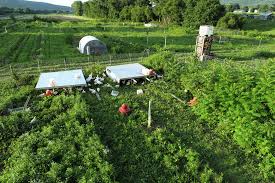Nestle Supporting Regenerative Agriculture, Guaranteeing Food Security

By EDET UDOH
Introduction
Food security remains a challenge for Africa and regenerative agricultural practices can play an important role in building resilience while sustaining agricultural production and preserving diversity of ingredients and rich biodiversity that guarantees food security and economic prosperity.
This article examines Impacts of Climate Change on Environment; explains Regenerative Agriculture; highlights Nestle’s Supports for Regenerative Food System; It’s reasons for partnering with Africa Food Prize; explains why Young People are encouraged to participate in Agriculture, and in conclusion emphasises regenerative agriculture as the best hope for creating a future we all want to live in, and one our children will be happy to inherit.
Impacts of Climate Change on Environment
Climate change is the global phenomenon characterised by the changes in the usual climate of the planet (regarding temperature, precipitation, and wind) that are especially caused by human activities. As a result of unbalancing the weather of Earth, the sustainability of the planet’s ecosystems is under threat, as well as the future of humankind and the stability of the global economy.
The impacts and challenges of climate change are becoming increasingly evident throughout Africa. Drought and flooding rains, significant soil erosion, coupled with increasing input prices and volatile sales prices result in Small Holder Farmers (SHFs) suffering from low productivity and profitability. Natural capital degradation underpins the agricultural industry. Farmland is being abandoned as job seekers head to major urban centres to find work and sustenance; hence the solution lies in Regenerative Agriculture; which is equally referred to as agroecology
Regenerative Agriculture Explained
According to Natural Resources Defense Council (NRDC), “Regenerative Agriculture is a philosophy and approach to land management, that asks us to think about how all aspects of agriculture are connected through a web—a network of entities who grow, enhance, exchange, distribute, and consume goods and services—instead of a linear supply chain. It’s about farming and ranching in a style that nourishes people and the earth, with specific practices varying from grower to grower and from region to region. There’s no strict rule book, but the holistic principles behind the dynamic system of regenerative agriculture are meant to restore soil and ecosystem health, address inequity, and leave our land, waters, and climate in better shape for future generations.”
“Regenerative Agriculture,” according to Centre for Dryland Agriculture (CDA), “is a system of farming principles and practices that increases biodiversity, enriches soils, improves watersheds, and enhances ecosystem services. Regenerative Agriculture aims to capture carbon in soil and aboveground biomass, reversing current global trends of atmospheric accumulation. At the same time, it offers increased yields, resilience to climate instability, and higher health and vitality for farming and ranching communities.”
Statistics obtained from CDA, showed that “Africa has the most under-exploited potential for agricultural production with Smallholder farmers playing a key role in the global agricultural value chain, especially in Sub Saharan Africa (SSA). With limited access to markets, inputs, and finance, they are frequently caught up in a cycle of producing low-yielding and low quality crops.
“About 70% of sub-Saharan Africans are smallholder farmers. Therefore, improving their productivity will allow suppliers to meet both local and soaring global demand for food (especially high value crops) and open a sizable new consumer sector. In addition to low productivity of the SHFs, the devastating effects of climate change are becoming increasingly apparent. The recent flooding in many parts of Northern Nigeria serves as an example, thereby exposing Nigeria to food insecurity and increasing hunger and poverty.”
Findings from the International Trade Administration (ITA) stated that in Nigeria, for instance, “agricultural sector has been hurt by several shocks: regular flooding, desertification of crop and grazing land, extremist insurgencies, and conflicts between herdsmen and local farmers. Food processing continues to suffer from a lack of financing and infrastructure. These challenges have exacerbated food inflation. Food inflation rose to 23.75% in December 2022. There were wide-ranging price increases across items such as cereals, yam, meat, fish, and fruits. Additional upward pressure is caused by devaluation of the local currency (naira) which has been devalued multiple times since 2021. Also, higher fuel prices and insecurity have also contributed to rising food prices as transportation costs increase.
“The agriculture sector grew merely 1.3% in the third quarter of 2022. The agriculture sector’s stunted growth is due to low productivity, inaccessible or expensive inputs, and increasing post-harvest loss due to poor logistics and insecurity across the country.”
With this in mind, there is a need for farmers to embrace sustainable agricultural practices, which is the regenerative farming system, and Nestle has remained a strong advocate for environmental sustainability in all aspects, and one of the ways the company is doing this is by supporting regenerative agriculture practices, to ensure enough foods that will feed about 1.6 billion people are produced.

Nestle’s Support for Regenerative Food System
To this end, Nestlé has laid out its plans to support and accelerate the transition to a regenerative food system –one that aims to protect and restore the environment, improve the livelihoods of farmers and enhance the well-being of farming communities. Nestlé is working with its food system partners, including the company’s network of more than 500,000 farmers and 150,000 suppliers, to advance regenerative farming practices at the heart of the food system.
As part of this journey, the company also initiated new programmes to help address the social and economic challenges of the transition, while taking a holistic approach to managing it’s impact on the environment – joining the dots between climate change and related issues including water stewardship, biodiversity and human rights.
Nestle has Announced its readiness to support the transition to regenerative agriculture at the lead-up to the United Nation (UN) Food Systems Summit in New York in 2021, as part of Nestlé’s contribution to help achieve the Sustainable Development Goals (SDGs) by 2030. It also follows the recent report from the United Nations’ Intergovernmental Panel on Climate Change that shows the climate crisis is intensifying.
“We know that regenerative agriculture plays a critical role in improving soil health, restoring water cycles, and increasing biodiversity for the long term,” said Paul Bulcke, Chairman of Nestlé. “These outcomes form the foundation of sustainable food production and, crucially, also contribute to achieving our ambitious climate targets.”
“Nestlé is a signatory of the UN Business Ambition for 1.5°C pledge and was one of the first companies to share its detailed, time-bound climate plan in December 2020. The company is taking measures to halve its emissions by 2030 and achieve net-zero by 2050.
“With our long-standing partnerships with farming communities globally, we want to increase our support for farming practices that are good for the environment and good for people,” said Mark Schneider, Nestlé CEO. “In the spirit of enabling a just transition, it is vital that we support farmers around the world that take on the risks and costs associated with the move towards regenerative agriculture.”
To spark regenerative agriculture across the company’s supply chain, using three primary levers to help farmers adopt regenerative practices, Nestle CEO said the Company plans to invest CHF 1.2 billion in five years from 2021.
In Central and West Africa, Nestlé’s focus is to ensure the supply of local agricultural materials, create inclusive livelihoods for smallholder farmers (SHFs), women and youth while protecting environmental resources.
Since 2015, Nestle has been able to impact more than 56,000 beneficiaries under it’s Grains Plan in Nigeria and Ghana through mentorship, training on agricultural practices and provision of inputs. The firm also extend it’s support to young agripreneurs through training, business development and provision of inputs. More than 2000 of this young agripreneurs involved in maize, coffee and cocoa farming are already part of this promising journey.
Under it’s Cocoa Plan in Côte d’Ivoire and Ghana, Nestle has started income diversification activities like vegetable production, animal rearing and beekeeping as alternative sources of income for farmers, ensuring resilience and improved livelihoods among cocoa producing communities, as well as promoting financial independence initiatives through the implementation of Village Savings and Loan Associations (VSLAs) which serve as a community based “saving/borrowing” mechanism allowing farmers to build better lives for themselves and their communities.
To further promote regenerative agricultural practices, Nestle has, in the last five years, distributed more than 800,000 shade trees that protect cocoa trees and store carbon in the soil, improving biodiversity, and also encouraging farm crop diversification by providing 9,000 fruit crop seedlings to be integrated into cocoa farms. With it’s network of agronomists and partners, Nestle has strengthened the implementation of these programmes throughout the Central and West Africa region.
Regenerative agriculture contributes to a regenerative food system, which should be fair and transparent for all participants. Nestlé is committed to supporting improved and diversified farmer incomes through its sustainability programmes. Furthermore, Nestlé has implemented new living income programme for farmers in its value chain to make farming more attractive. It has also unveiled specific plans for its coffee and cocoa supply chains.
Partnership With Africa Food Prize To Accelerate Transformation of Food Systems
In November 2022, Nestle announced it’s partnership with the Africa Food Prize to help accelerate the transformation of food systems in Africa, as a way of strengthening the continent’s food security and building greater climate change resilience.
They have set aside USD 100,000 as the Africa Food Prize awards to be given to individuals and institutions that are pioneering agricultural and food systems transformation in Africa.
The Prize puts a spotlight on uniquely impactful agri-food initiatives and technological innovations that can be replicated across the continent to increase food security, spur economic growth and development, and eliminate hunger and poverty in Africa.
The Africa Food Prize is hosted by Sustainably Growing Africa’s Food Systems (AGRA), an African-led and Africa-based institution that puts smallholder farmers at the center of the continent’s growing economy by transforming agriculture from a solitary struggle to survive into farming as a business that thrives. AGRA is headquartered in Kenya and works in 15 African countries.
In 2022, Dr. Eric Yirenkyi Danquah, a plant geneticist from Ghana, was awarded the prestigious prize during September’s AGRF Summit in Kigali, Rwanda. Dr. Danquah was celebrated for his outstanding expertise and leadership in establishing the West Africa Centre for Crop Improvement (WACCI) and developing it into a world-class center for the education of plant breeders in Africa.
Nestlé contributed CHF 100,000 to the Africa Food Prize, which was awarded in 2023. Part of the contribution went to the main award and part to a special category focusing on innovations that advance regenerative food systems.
Remy Ejel, Chief Executive Officer of Zone Asia, Oceania and Africa, Nestlé S.A, speaking at the award ceremony said, “Transforming agriculture to be more productive and sustainable is key to reducing hunger and improving livelihoods for the long term. We aim to support and amplify efforts that spearhead regenerative agriculture and food systems to enable better productivity, better nutrition and better incomes for people in Africa.”
Commenting on the partnership, Dr Agnes Kalibata, President of AGRA said, “We are happy to be partnering with Nestlé to recognize Africa’s best in food systems. The Africa Food Prize is a great opportunity to shine a bright spotlight on Africa’s outstanding minds, giving the rest of us a chance to learn and replicate their good work that is moving us closer to sustainable, inclusive and resilient food systems and achieving the United Nations Sustainable Development Goals 2 on Zero Hunger.”
Nestlé’s partnership with the Africa Food Prize builds on its years-long work in Africa to improve the continent’s nutrition and agriculture. The company has taken great strides to expand access to affordable nutrition in many communities, for example, by fortifying Maggi bouillon cubes with iron in Central and West Africa. It is also pioneering regenerative dairy farming with the establishment of the first net zero dairy farm in Skimmelkran, South Africa.
In early 2022, Nestlé launched an innovative income accelerator programme, aimed at addressing child labour risks and closing the living income gap for cocoa-farming communities in Côte d’Ivoire and Ghana. Recently, Nestlé announced an investment of CHF 1 billion by 2030 under the Nescafé Plan to transition to sustainable coffee farming, including in Côte d’Ivoire.
Entries in the Africa Food Prize are evaluated by a judging committee comprising some of Africa’s greatest food system leaders. Winners are selected based on proven results and scalable efforts.
Encouraging Participation of Young People in Agriculture
To support young people who are passionate about farming, Nestlé has launched a new training platform to attract and train the next generation of farmers. The training focuses on regenerative agriculture practices and improving the resilience of farms to climate change for more than 40,000 farmers participating in one of Nestlé’sagripreneurship programmers.
Nestlé’s regeneration efforts are launched under the umbrella title of “Generation Regeneration” focused on farmers, youth, consumers and its own employees.
To ensure success, Nestle is applying state of state-of-the-art science and technology, provide technical assistance and leveraging its vast network of Research and Development (R&D) experts and agronomists, Nestlé is, for example, developing higher-yielding coffee and cocoa varieties with lower environmental impact and assessing novel solutions to reduce emissions in the dairy supply chain.
Nestlé offers agricultural training and help farmers exchange information and best practices that can be adapted locally.
It offers investment support knowing that the transition to regenerative agriculture comes with initial risks and new costs. Nestlé is also supporting farmers by co-investing with them, facilitating lending or helping them obtain loans for specific equipment. The company is also working with partners to fund pilot projects to test and learn how best to advance regenerative agriculture.
Nestlé offers premiums for many raw materials produced using regenerative agriculture practices and buy bigger quantities. This means rewarding farmers not only for the quantity and quality of ingredients but also for the benefits they provide to the environment through soil protection, water management and carbon sequestration.
Today, Nestlé published the most important regenerative farming practices that the company is promoting. They include, among others, enhancement of biodiversity, soil conservation, and regeneration of water cycles and integration of livestock. Agriculture accounts for nearly two-thirds of Nestlé’s total greenhouse gas emissions, with dairy and livestock making up about half of that. Nestlé is assessing cutting-edge science and technology to reduce emissions at the farm level.
Conclusion
The natural capital underpins the survival of every economy and society. It is the foundation upon which rural economies are based and by extension, it is what builds the entire ecosystem. Our natural capital is finite and currently under utmost pressure. This pressure will increase with climate changes and the population rises. There is need to find better ways of managing our natural assets, making them more resilient, or we risk losing the benefits that we receive. These benefits include clean water; carbon storage; and soils which are essential for cultivation of food for man and feed for livestock.
“The use of Regenerative Agricultural designs and Practices is to identify and unlock productivity, provide traceability and alternative markets especially for high value crops. Soil regeneration is necessary in sub-Saharan Africa.
“Regenerative agriculture is our best hope for creating a future we all want to live in, and a future our children will be happy to inherit. Soil carbon sequestration through regenerative agriculture is a known, proven, technical, remedy to global warming: it gives humanity the necessary time to decarbonise.
“By investing in multiple farming system trials, we can both provide the needed data to support widespread transition directly work towards that transition through incubating skills and providing a global support network, on the ground, for farmers to lead the evolution to regenerative systems. This positive, hopeful vision for our future addresses many of our most pressing societal issues.
“It is hoped that the period of sustainability will transition to regeneration, where what we are really doing with our Lands is not only producing our foods but regenerating, improving, reforming to a higher level the Nigerian Agricultural landscape and beyond,” Centre for Dryland Agriculture stated in its article, “Developing Regenerative Agriculture, Market Solutions and Increased Climate Change Resilience for Farmers in Nigeria.”
Nestle, over the years, has continued to support the transition to regenerative agriculture as a sustainable agricultural practice aimed at preserving the environment for the future generations and ensuring availability of adequate food for all.





